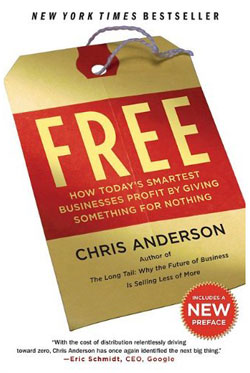The trouble with free
 Friday, May 6, 2011 at 5:00PM
Friday, May 6, 2011 at 5:00PM  Free is the new business model and we like free don’t we?
Free is the new business model and we like free don’t we?
Free search, free information, free social media, free apps, free newspapers - the list is almost endless as businesses adapt to this new model.
Business writer and editor-in-chief of Wired (£2 per copy on subscription), Chris Anderson (not to be confused with the guy who runs TED) followed his best selling Long Tail book with another best-selling book entitled “Free: How today’s smartest businesses profit by giving something for nothing” (available from Amazon for £5.45) which documents this 21st century business phenomenon.
The strap line for the book “How todays smart businesses profit...” is a clue to what’s happening here.
 One of the examples in the book concerns that of King Gillette and how he built a hugely successful empire on the back of giving away the razors that were useless on their own but created a demand for disposable blades.
One of the examples in the book concerns that of King Gillette and how he built a hugely successful empire on the back of giving away the razors that were useless on their own but created a demand for disposable blades.
Billions of blades later the rest is history giving birth to a business model that is the foundation of entire industries from free mobile phones with monthly call/data plans to cheap video game consoles with pricey games to free coffee machines in offices with expensive coffee sachets to satellite TV with monthly subscriptions and so on.
The approach pioneered by Gillette became known by economists as “cross-subsidy”. Get something free as long as you bought something else.
Anderson convincingly proposes that a new kind of “free” business model has emerged as a result of the web because the costs of the products themselves is falling fast. Recording artists Prince, Radiohead, Nine Inch Nails and the thousands of artists who launched themselves off YouTube and MySpace have all benefitted from the audience-building concept of nada.
But you know what? None of this is free
Whether it’s that free newspaper you pick up on your morning commute or that Facebook page you update religiously, someone, somewhere is paying.
But as long as it’s not you it’s great right?
Well, maybe...
Let’s play a game. Answer me these questions, if only in your head.
How much would you charge to sell me:
- your web-browsing history?
- your purchasing history?
- your list of friends and business contacts?
- your social security number and credit card info?
 We are now so conditioned to free that we sometimes forget to value these things to balance the deal.
We are now so conditioned to free that we sometimes forget to value these things to balance the deal.
So what has this to do with learning and education?
Well, a friend of mine in the UK education sector recently told me that due to the cuts in public sector spending that he would no longer be able to attend paid-for conferences.
Another colleague in government told me that an edict from the UK Cabinet Office stated that departments could no longer support commercially operated events. Now I don’t mean events designed for commercial purposes like trade shows that also fall under the ban but also any event that is being operated by a commercial company - like LWF for example.
At first pass given the precarious state of of public finances in the UK these seem like prudent measures to encourage the private sector to become more resilient and less dependent on the public purse.
I’d also be the first to say that during the glory days there were a host of chancers who would set up a conference at the drop of a new government agenda and trouser the cash. These events added little to the idea of debate and were simply promotional exercises for the agenda, its followers and any commercial parties who were in on the act. Those in attendance got their day out, a free lunch and nodded (off) at the required times.
Optional musical interlude:
Naturally, as someone who monetizes their organisation by hosting events, I have an interest here. LWF’s “free” bit is the distribution of valuable resources and facilitating a platform for unfettered dialogue made possible by this “monetization”.
But what if we did it a different way?
What if we made all our events free to attend?
Well, we have thought about it and it could be done. However the nature of the events and the discussion via our various communities would change beyond a point that I would feel comfortable. There a numerous free events, summits and even “world forums” aimed at the education sector. Some even fly you across the world and put you in expensive hotels.
There a numerous free events, summits and even “world forums” aimed at the education sector. Some even fly you across the world and put you in expensive hotels.
But are they free?
No, they’re not and someone is paying. Someone who quite reasonably has an interest in gaining a return on their investment which means the programme of these events, just like the editorial in your free newspaper, will be influenced by those who control the purse.
The education supply sector is after all a business, no different from any other. It relies on influencing the thought leaders, opinion formers and budget holders.
Without commercial supporters the delegates would have to shoulder the entire costs of attending the event which could be considerable. The rightly renowned TED conferences charge their delegates upwards of $6,000 to attend and even then take sponsorship dollars for funding the pre-roll on their gorgeous videos.
But what commercial organisation in their right mind would support a dialogue that may question their position in the market or enable an open dialogue that may take the market in a totally new direction that isn’t in line with their business plan and quarterly returns?
Only those who are courageous, authentic and secure in their own position. Of course, as a reader of this blog you’re smart and savvy. You know when you’re being sold to and when the agenda is being pre-programmed to deliver a certain result.
Of course, as a reader of this blog you’re smart and savvy. You know when you’re being sold to and when the agenda is being pre-programmed to deliver a certain result.
I’m not as naive as to suggest that some of those free junkets or conferences hosted by a single commercial vendor or consortium don’t hold an element of value, after all if nothing else there’s always a chance to catch up with your mates, but the control of debate and the agenda solely for commercial ends fills me with concern when it relates to the future of learning and that of our children.
And that’s why free ends up being the most expensive option of all.
 Graham |
Graham |  5 Comments |
5 Comments | 
